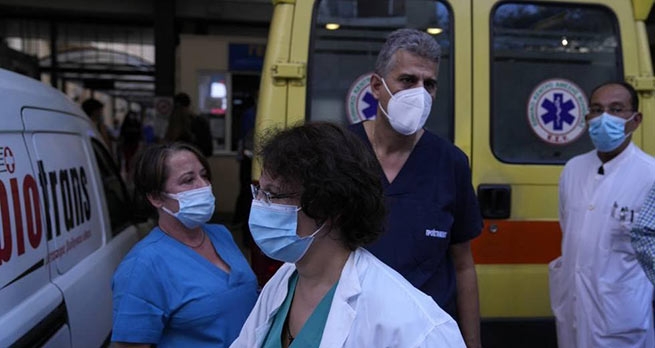The Plenum of the Supreme Council of State (Supreme Court of Greece) recognized the procedure for mandatory vaccination of medical workers as constitutional, rejecting the petition for annulment filed by ΠΟΕΔΗΝ.
However, five members of the council ruled that the suspension measure was “disproportionate to achieve the intended purpose, and the legislator should have provided for the payment of a minimum percentage of remuneration.” Further in more detail.
The Plenary Resolution of the Supreme Court of Appeal No. 1684/2022 rejected the PDEDN’s petition to set aside the decision of the Minister and Deputy Minister of Health Δ1α/ΓΠ.οικ.50933/13-8-2021 “Procedure and grounds for exemption from compulsory vaccination”.
As emphasized in the decision of the Supreme Court, “the measure of vaccination, as such, constitutes a serious interference with the free development of the personality and the private life of a person, with the physical and mental integrity of a person, but it is constitutionally permissibleif, in accordance with the foregoing, provided for by special legislation fully accepting reliable and justified scientific, medical and epidemiological results in the relevant field and providing for the possibility of exemption from vaccination in specific individual cases for which vaccination is contraindicated.
The decision of the Supreme Court emphasizes that “the above intervention, if it is considered, according to sound scientific evidence, necessary and appropriate to protect the health of both the vaccinated and third parties (moreover, the occurrence, in a statistically very small number of cases, of serious side effects from certain of vaccines does not make the statutory provision for compulsory vaccination unconstitutional and is in any case permissible in the public interest, bearing in mind the principle of social solidarity (Article 25(2)(b) of the Constitution. 4 of the Constitution)…”.
As state advisers note, “healthcare workers in general are a group of professionals who are particularly at risk of contracting the virus. For this reason, the legislator has reserved the absolute priority of vaccination “due to the decisive importance of this group in overcoming the health crisis, the increased risk of infection and the special responsibility for preventing the risk of harm from disease transmission to hospitalized persons and other vulnerable persons in their care.”
In the light of the foregoing, a compulsory vaccination measure for health care personnel is not manifestly disproportionate to the achievement of its constitutional aim, which is the protection of public health, provided that the legislature has taken into account the scientific and epidemiological evidence that existed at the time of its adoption, as detailed above,” the document says.
► With regard to the suspension regime for those medical professionals who refused to be vaccinated, the plenary session of the Supreme Court ruled that “this measure is intended to oblige those to whom it applies to be vaccinated in order to achieve the goal of the legislator, that is, by vaccinating all personnel, working in healthcare facilities, protect the health of the population and prevent further spread of the coronavirus in these institutions.”
According to the decision of the Supreme Court, “this measure does not contradict the principle of proportionality.” This is because the suspension and its consequences, on the one hand, are intended to ensure the fulfillment of the legal obligation to vaccinate, and on the other hand, are not indefinite, but are applied until the mandatory vaccination measure is reassessed, which in any case must be done within a reasonable time.”
However, in the opinion of the five government lawyers, “the suspension measure, with all the attendant consequences mentioned above, is disproportionate to the aim pursued, and the legislator should have provided for the payment of a minimum remuneration.”
In addition, “according to the separate opinion of the two aforementioned councilors, the contested decision also contradicts the principle of proportionality, enshrined in Article 103 par. 4 of the Constitution, the principle of the irremovability of civil servants.”







More Stories
Why cats don't go to your hands and don't like to be petted
When does old age begin? The answer to this question changes with age.
Association of Professional Nutritionists to be created in Greece